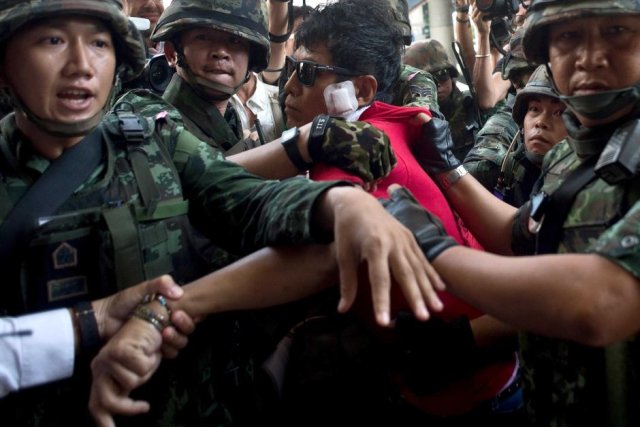
If you are wondering why the opposition to the military junta that seized power in May has gone quiet and wondering if the democracy side has lost, it is important to look a bit deeper into Thai society and the state of the movement.
After the spectacular anti-coup protests in late May, the junta have systematically arrested and detained key activists, forcing them to promise not to engage in politics.
The military has made it clear that any further activities would result in jail sentences via military courts. Some of those who were detained have been fitted up with lese majeste (“insulting the monarch”) charges.
The junta is gambling on the idea that if they create a climate of fear, by arresting and detaining enough anti-coup protesters and pro-democracy activists, people will eventually become demoralised and inactive.
The question we must ask ourselves is: have they succeeded or is this merely a temporary situation?
The junta’s strategy will not work if democracy activists get organised in an underground movement and continue a low intensity struggle that can break into a mass uprising like in 1973, 1992 and 2010.
This brings us to the issue of organisation and leadership.
To understand the Red Shirt movement, which is vitally important to the struggle for democracy, we need to see the struggle of the Red Shirts as a kind of “parallel war”.
On the one hand, thousands of ordinary Red Shirts have struggled for democracy, dignity and social justice. On the other, former prime minister and key Red Shirt backer Thaksin Shinawatra and his political allies waged a very different campaign to regain the political influence they enjoyed before the 2006 coup d'etat.
Yet at the same time Thaksin, Pua Thai and the United Front for Democracy Against Dictatorship (UDD) leaders, who support Pua Thai, have enormous influence over the Red Shirt movement. This is contradictory and dialectic, because the Red Shirts are both self-organised with their own agenda, but also support Thaksin and Pua Thai.
This is where the question of organisation and leadership becoing vitally important.
Up until now, the strategy and tactics of Red Shirt leaders has come from the UDD and Pua Thai. But this leadership has surrendered to the military, hoping for a compromise in the future.
They do not want to bring down the old order and are afraid that if they lead a mass movement against the military, this might happen and then slip out of their control. They are more interested in future political careers irrespective whether Thailand has real democracy or some kind of Burmese-style model.
The aims of the UDD and Pua Thai do not correspond to the dreams and aspirations of millions of Red Shirts. But for Red Shirts to act independently of their failed leaders, activists need to be organised and progressive elements need to fight for an alternative leadership.
This has to involve the more independent Red Shirts who have so far turned their backs on serious organising, preferring loose networks. But without serious political organisation and an alternative political strategy, the dictatorship cannot be overthrown.
Such organisation must be carried out in secret, which means it is difficult to know whether or not it is taking place right now.
However, if the junta wins this round, it will only be temporary. To understand why, we need to reject nonsense theories that concentrate only on elite struggles for power around the Palace and other institutions.
The root cause of the Thai crisis is the growing dissatisfaction of millions of Thai citizens with the old way of doing politics. This old way created great inequalities of wealth as the economy developed and a feeling by most Thais that they were second-class citizens.
Thaksin exploited this feeling to win repeated elections. The clock cannot be turned back to the 1960s and any system of half democracy imposed by the junta will not be able to paper over the deep cracks which exist in society.
[Reprinted from Red Thai Socialist. Giles Ji Ungpakorn is a Thai activist and writer who is a member of the socialist group Left Turn. He has lived in exile since 2009 after being charged with lese majeste.]